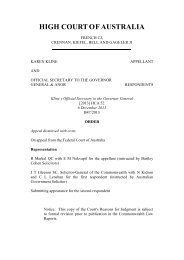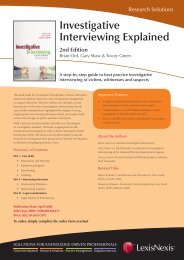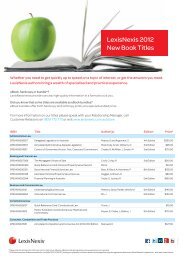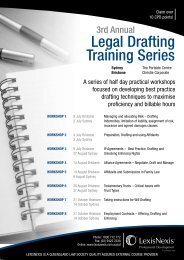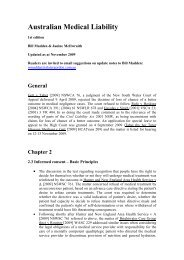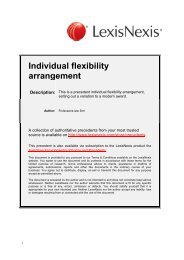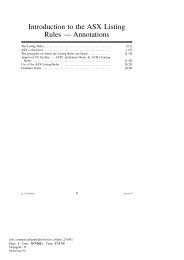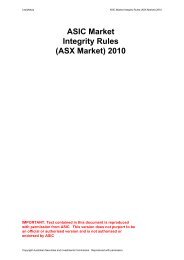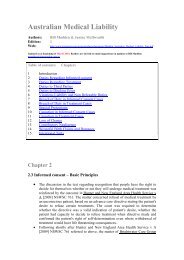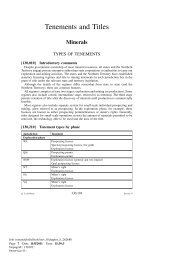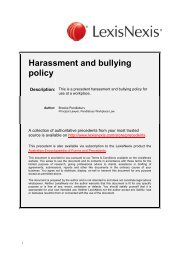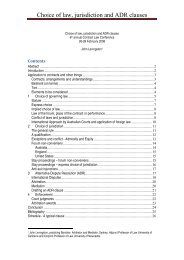Copyright LexisNexis. Sample only, not for classroom use or ...
Copyright LexisNexis. Sample only, not for classroom use or ...
Copyright LexisNexis. Sample only, not for classroom use or ...
Create successful ePaper yourself
Turn your PDF publications into a flip-book with our unique Google optimized e-Paper software.
283<br />
CHAPTER 12: EQUITABLE ESTOPPEL<br />
[The] doctrine [of equitable estoppel] … permits the court to do what is required in <strong>or</strong>der to avoid<br />
detriment to the party who has been induced to act upon an assumed state of affairs … [T]hus …<br />
acc<strong>or</strong>ding to the circumstances of any given case, the relief required may be less than making good<br />
the assumption on the basis of which the plaintiff was encouraged to deal … [W]hat is required to<br />
satisfy the equity which arises against an estopped party depends on the circumstances.<br />
12.61 However, it is clear that, in proprietary estoppel cases, a court will usually frame an<br />
expectation based <strong>or</strong>der in the sense of making good the assumption <strong>or</strong> expectation relied upon by<br />
the relying party, rather than on the avoidance of detriment: Dela<strong>f<strong>or</strong></strong>ce v Simpson-Cook at 492–7. In<br />
Ramsden v Dyson, at 170, L<strong>or</strong>d Kingsdown said:<br />
If a man … under an expectation created <strong>or</strong> encouraged by the landl<strong>or</strong>d that he shall have a<br />
certain interest [acts to his detriment] upon the faith of such expectation … a Court of equity will<br />
compel the landl<strong>or</strong>d to give effect to such … expectation.<br />
12.62 Similarly, in Donis v Donis (2007) 19 VR 577 at 582–3, Nettle JA said the following:<br />
As the … decision in Giumelli v Giumelli shows … there is no such restriction in cases where the<br />
expectation which is encouraged is the acquisition of an interest in property. In such cases the<br />
remedy relates to the understanding of the parties and the expectation that has been encouraged.<br />
Prima facie the estopped party can <strong>only</strong> fulfil his <strong>or</strong> her equitable obligation by making good the<br />
expectation which he <strong>or</strong> she has encouraged. The estopped party, having promised to confer a<br />
proprietary interest on the party entitled to the benefit of the estoppel, and the latter having acted<br />
upon the promise to his <strong>or</strong> her detriment, is bound in conscience to make good the expectation<br />
… The prima facie position will yield to individual circumstances. Principle and auth<strong>or</strong>ity compel<br />
the view that where a plaintiff’s expectation <strong>or</strong> assumption is uncertain <strong>or</strong> extravagant <strong>or</strong> out of<br />
all prop<strong>or</strong>tion to the detriment which the plaintiff has suffered, the court should recognise that<br />
the claimant’s equity may be better satisfied in a<strong>not</strong>her and possibly m<strong>or</strong>e limited way … [B]e<strong>f<strong>or</strong></strong>e<br />
granting relief the court is required to consider all of the circumstances of the case, including the<br />
possible effects on third parties, and to avoid going beyond what is required <strong>f<strong>or</strong></strong> conscientious<br />
conduct <strong>or</strong> would do injustice to others. But that does <strong>not</strong> mean that the court is required to be<br />
‘constitutionally parsimonious’ <strong>or</strong> that it is necessary <strong>f<strong>or</strong></strong> there to be substantial c<strong>or</strong>respondence<br />
between expectation and the monetary value of the detriment suffered, <strong>or</strong> which but <strong>f<strong>or</strong></strong> the relief<br />
to be acc<strong>or</strong>ded would be suffered.<br />
12.63 In Giumelli v Giumelli the High Court said there was <strong>not</strong>hing in earlier cases that precluded<br />
a court from granting relief in equitable estoppel cases on the basis of making good the relying<br />
party’s assumption <strong>or</strong> expectation. In Giumelli v Giumelli at CLR 123; ALR 484, Gleeson CJ,<br />
McHugh, Gummow and Callinan JJ cited with approval a statement by Deane J in Commonwealth<br />
v Verwayen at CLR 445; ALR 356, where his Honour said:<br />
[T]he question whether departure from the assumption would be unconscionable must be resolved<br />
<strong>not</strong> by reference to some preconceived <strong>f<strong>or</strong></strong>mula framed to serve as a universal yardstick but by reference<br />
to all the circumstances of the case, including the reasonableness of the conduct of the [relying] party<br />
in acting upon the assumption and the nature and extent of the detriment which he would sustain by<br />
acting upon the assumption if departure from the assumed state of affairs were permitted.<br />
The types of <strong>or</strong>ders that can be made in fulfilling the expectation include <strong>or</strong>dering a transfer of<br />
the property to the relying party, the imposition of a trust, <strong>or</strong> granting a charge <strong>or</strong> lien over the<br />
<strong>Copyright</strong> <strong>LexisNexis</strong>. <strong>Sample</strong> <strong>only</strong>, <strong>not</strong> <strong>f<strong>or</strong></strong> <strong>classroom</strong> <strong>use</strong> <strong>or</strong> distribution.<br />
Spi-Radan & Stewart - Principles of Australian Equity and Trusts 2nd ed. Ch.12.indd 283 10/10/2012 05:22:31<br />
200595



